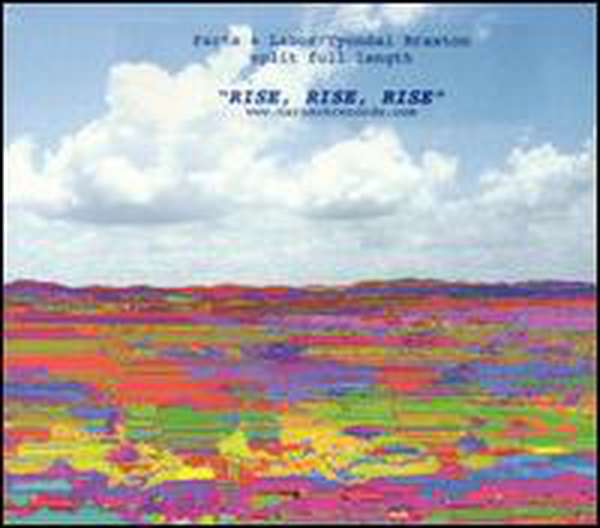Brooklyn strikes again with this 2-for-1 bargain from noise rock provocateurs Parts & Labor and loop-based composer Tyondai Braxton. Rise Rise Rise may only be the second major release from each of the two parties involved, but surprisingly enough, it manages to exhibit more progress than a second - not to mention split - release would normally demonstrate.
Parts & Labor's debut, Groundswell, was a stiff but largely exhilarating affair - very much the effort of a promising young act with a definite sound of their own still trying to find their footing. On their debut, Parts & Labor mixed circuit-bent keyboards with a rhythm section whose pummel and ferocity rivaled that of any band on the Load Records' roster. This time around, the trio is much more refined in their approach, incorporating loads of new stylistic elements into the mix without ever compromising their core "sound."
For starters, check out that tasty, almost sample-worthy hip-hop groove the group busts into on "Probably Feeling Better Already." On "Good Morning Black Eye," the group rattles some cheaply recorded kitchen-sink percussion while a twee, childlike melody gets plucked out haphazardly on an acoustic guitar - it's unexpectedly captivating stuff. Speaking of guitars, with the introduction of the six-string to his usual arsenal of vintage synthesizers, keyboardist Dan Friel manages to coax a number of rather unusual and interesting textures (whines, gurgles, warbles, etc.) throughout the eight tracks Parts & Labor contribute to the split. Rise Rise Rise also marks the first time vocals appear on a Parts & Labor release (for quick reference, skip to "Days In Thirds" and "The Endless Airshow"). Friel and bassist BJ Warshaw contribute their not terribly unique voices to the proceedings in a manner that certainly doesn't sound out of place here, but doesn't really add anything new or spectacular to the mix.
If Parts & Labor continue to evolve at this pace, I could seriously see a lot of bright lights in this band's future. Hell, you can already whistle just about every one of their tunes. I'd definitely keep my eye on these fellas.
Whistling is something I imagine Tyondai Braxton knows a little something about - on his 2002 debut History That Has No Effect, Braxton whistled, wheezed, and beatboxed his way into our hearts with a little-noticed record that felt strangely familiar but at the same time sounded seemingly unlike anything that came before it. "History That Has No Effect" fused various vocally-derived noises with the weirdo sonic experimentation of Steve Reich, Glenn Branca's ensembles, Black Dice, and maybe even Merzbow, but brought it all together with a grit and soul belonging solely to Braxton.
Though at times a bit on the cacophonous side (though in a numbing, almost-Zen kind of way), "History That Has No Effect" was a largely reserved set of songs, so maybe in an attempt to approximate Parts & Labor's frenetic displays of unrelenting, mostly instrumental fury, Braxton showcases a much more animated side on "Stand There" (a response to Parts & Labor's opening track, "Just Don't Fucking Stand There," possibly?) which features the Yeah Yeah Yeah's Brian Chase on drums. Braxton intones in harmony while Chase goes to town on the skins, backed by a de-tuned guitar and electronic squeals and trills. "Disintegrating Reels" takes things down a notch, illustrating a much more subdued sound than I've ever heard from Braxton. The song opens with a subtle vocal melody, accompanied by a simple one-chord arpeggio performed on an electric guitar, and soon enough a counterpoint vocal melody and otherworldly textures begin to surface. By the time you've realized what's going on, the entire song has moved in a completely new direction, complete with Braxton's own human beatboxing and the well-placed contributions of a horn and string section.
"Jackpot" closes the album on a rather somber note with a moody piano melody accompanied by electronic babbling and minimalist percussion (also performed by Chase) that eventually turns to full drums by the end of the track. A bit after the midway point, drastically pitch-shifted vocals appear and the entire piece ends with a caterwauling crescendo.
What struck me most about Braxton's half of Rise Rise Rise was not just the sheer originality of his compositional approach or the fact that he could actually pull off these dense soundscapes using only the most rudimentary of materials, but how he managed to put it all together and, more importantly, create coherent, interesting, and, dare I say, even catchy (in a very skewed, deranged sort of way, of course) songs from the dense soundscapes.
Rise Rise Rise marks an interesting point in both Braxton and Parts & Labor's careers. Each are at a point where they've accrued their own sounds, and they've done a bit of experimenting, but now they've begun to move forward and take their respective sounds to the next level. Exactly what that next level will encompass, I'm not completely certain. Of what I am certain is that Rise Rise Rise is the sound of two intensely promising acts coming into their own.



